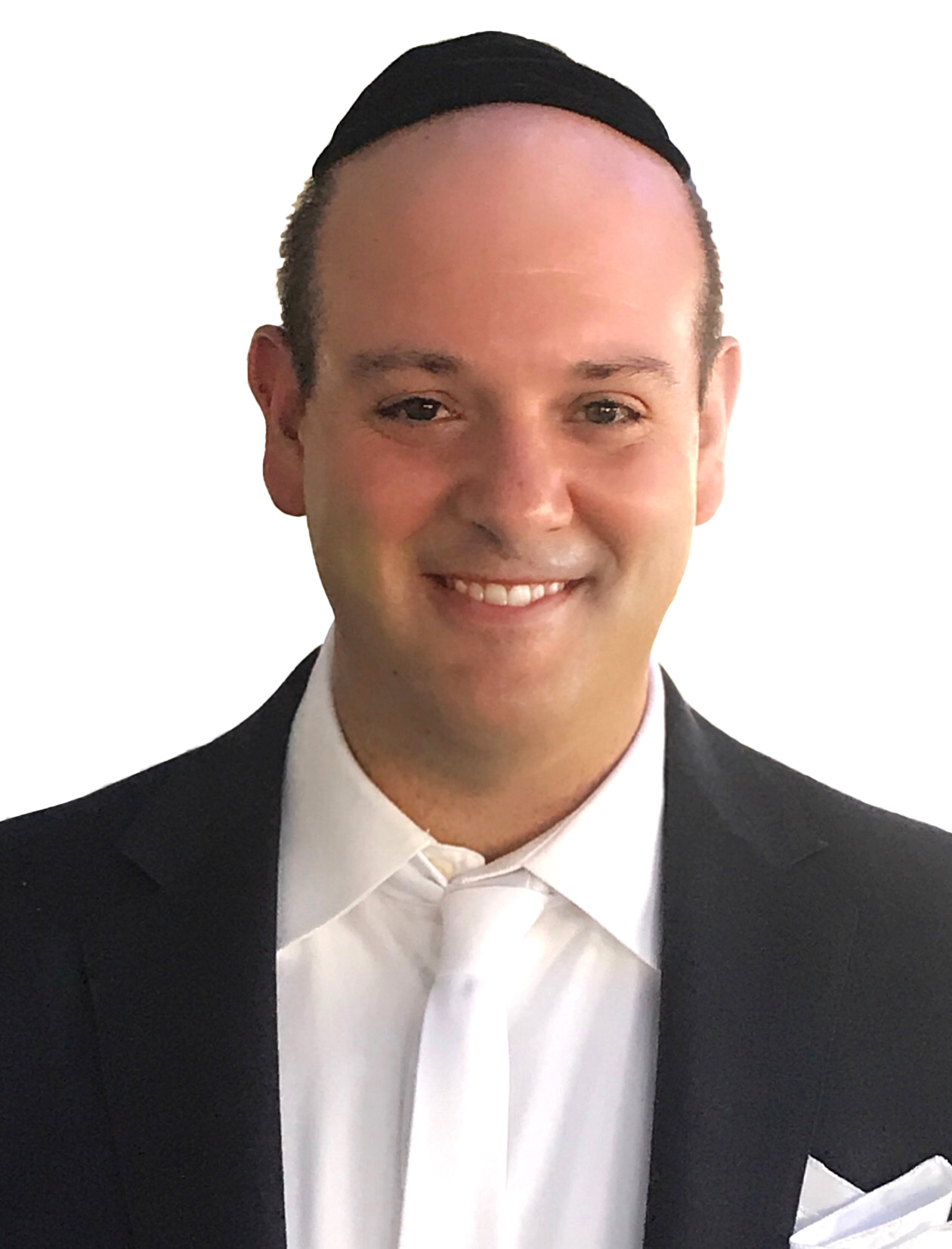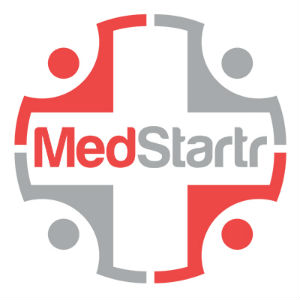Spessel: A Specimen Collecting Vessel
A purposefully designed, disposable device that collects a midstream urine sample in frail, elderly women
Poway , CA United States Medical Device Geriatric Medicine MedStartr Ventures challengeAbout our project
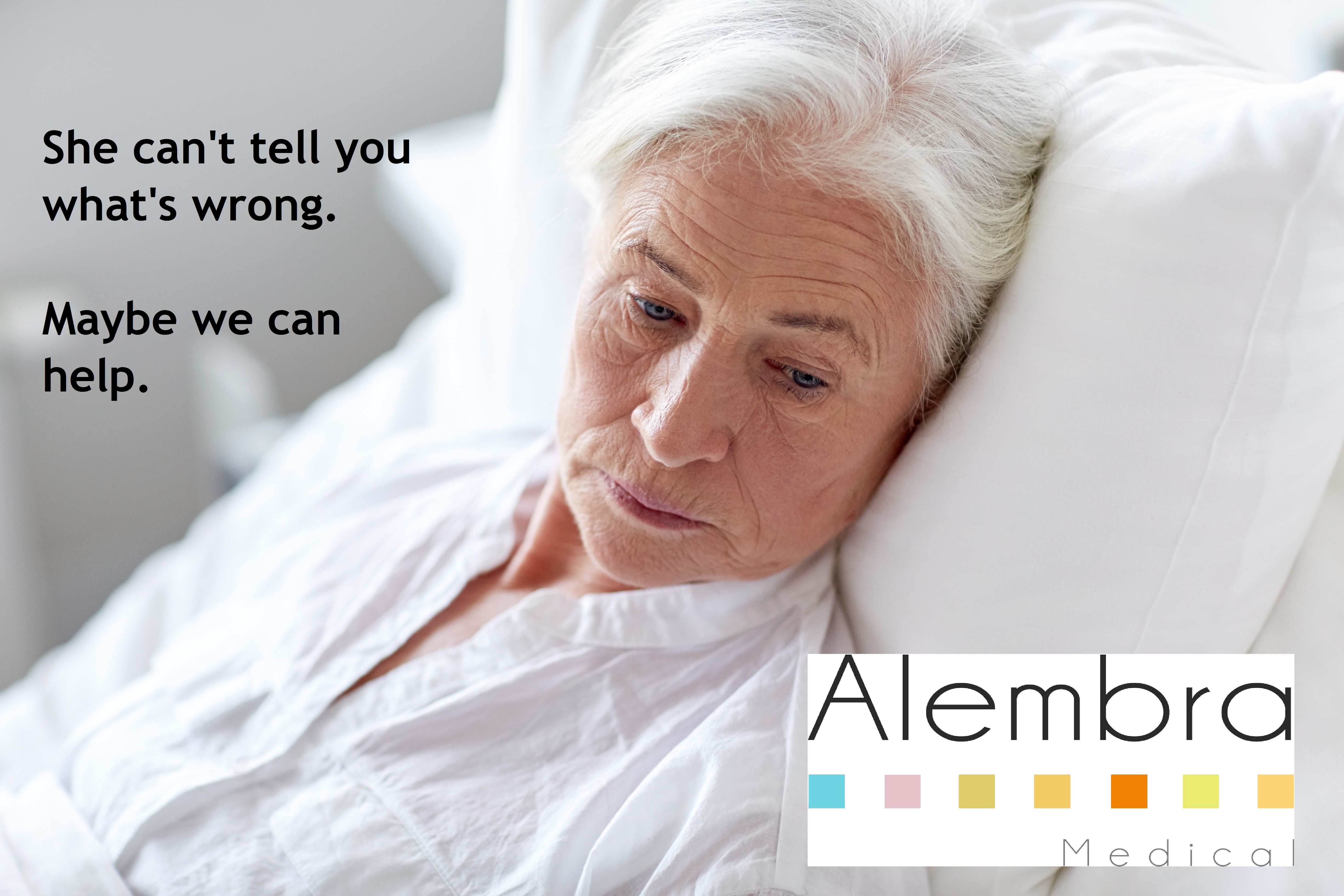
The problem we solve: Frail elderly women, who as a group are highly burdened by urinary tract infections (UTIs), are often unable to comply with the urine collection process because of physical and/or cognitive impairments. Spessel is a game-changing alternative to the current, flawed options: bedpans and catheters. By providing caregivers with a purposefully designed tool, Spessel will help provide timely and targeted diagnosis and treatment of UTIs in a vulnerable population that needs it most.
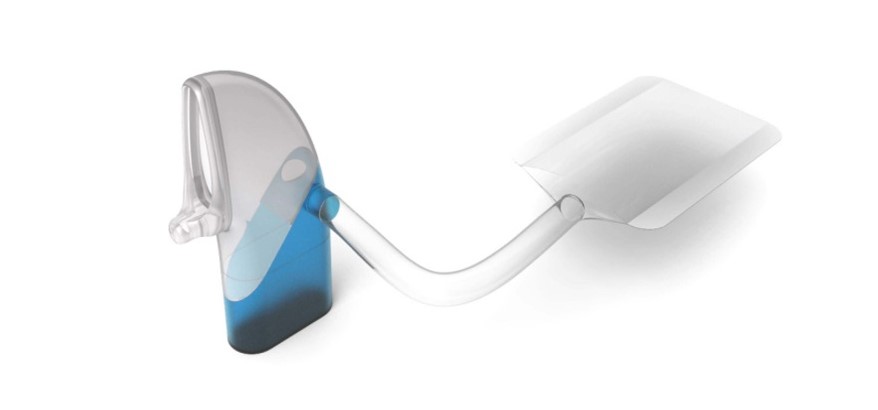
About our solution: Spessel conforms to the female anatomy and collects a midstream urine sample easily and efficiently. The disposable device sits comfortably next to the perineum and includes an opening that surrounds around the urethra. When the patient voids, the first pass of contaminated urine collects in one section and the remaining clean sample flows into an easy to access receptacle. The patient doesn’t need to follow any instruction or participate in any way and she can remain in bed if needed. Since the device sits outside the urethra, placement is not a sterile procedure. This means it can be used by non-licensed carers in any number of outpatient settings.
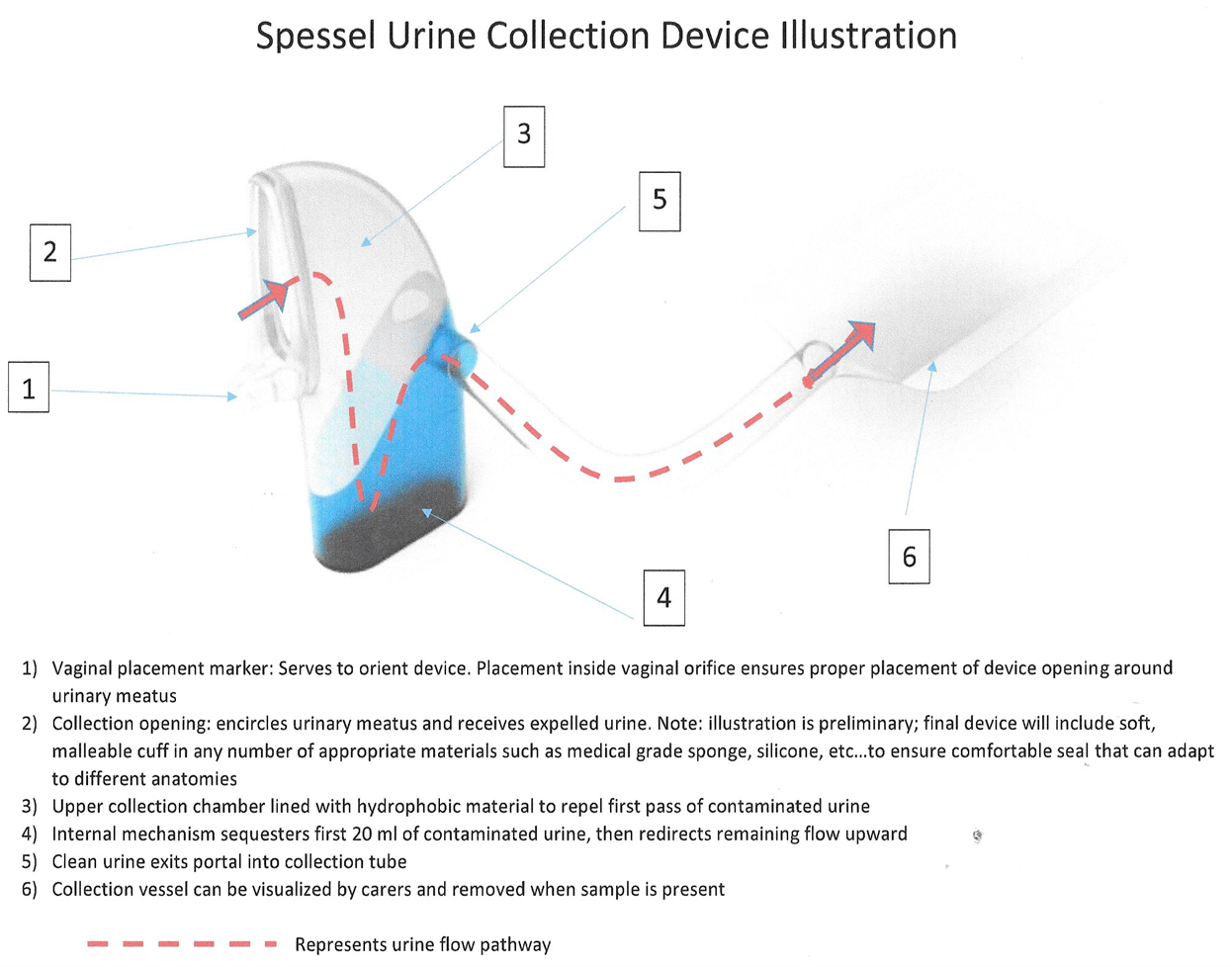
Progress to date:
Our inaugural prototype has been successfully bench tested and a non-provisional utility patent/PCT is pending. FDA pre-submission review has established that Spessel is 510k exempt based on an appropriate predicate. Surveys of nurses and physicians in hospitals and nursing homes have validated our assumptions about the problem, need for a solution and potential for our product to solve the problem.
- Winner, Shark Tank Competition, Nurses in Business Association national conference, 2016
- Winner, Start-up Pitch Competition, Women in Bio SoCal, 2016
- Winner, Champions of the West competition, manufacturing/innovation category, NSW, Australia, 2014
- Innovate NSW Minimum Viable Product Grant, New South Wales Department of Trade and Investment, 2014
About Our Team
Creator: Naomi Travers
Location: California
Education: University of California, San Francisco , Mas
Bio: Naomi Travers is a board-certified geriatric nurse practitioner with over 15 years experience in the nursing field. She is the founder of Alembra Medical and inventor of Spessel, a specimen collecting vessel that captures a clean midstream urine sample from physically and/or cognitively impaired female patients.
Hospital Affiliation: Clinic
Title: CEO
Advanced Degree(s): GNP-BC, RN, MSN
About Team Members
George Sidis
Managing Director, ide+, product development , Bachelor of Engineering, University of New South Wales
Biography: George Sidis is a Founder and the Managing Director of ide Group. With a degree in Chemical Engineering, Sidis also has a wealth of experience in R&D having previously worked with PWC to help businesses with technology commercialisation, financing, business planning and start-up strategies for new ventures. Sidis is also a Founder and Non-Executive Director at Atomo Diagnostics, an innovative Point of Care diagnostic device company.
Title: Managing Director, ide+, product development
Advanced Degree(s): Bachelor of Engineering, University of New South Wales
LinkedIn:
https://www.linkedin.com/in/georgesidis?authType=name&authToken=lM9L&trk=prof-sb-browse_map-name
Willem Mees van der Bijl
Product Development Manager at ide+, Industrial Design Engineering
Biography: Willem Mees van der Bijl is a Product Development Manager at ide Group. Van Der Bijl has over 15 years of experience developing and implementing new product innovations and has led design and engineering teams in The Netherlands and Australia. Among the products he has helped realise include the Swissray Medical Imaging Digital Radiography System, the ZorgXcel diabetic care innovation program and the DOCKX Medical bariatric surgery chair.
Title: Product Development Manager at ide+
Advanced Degree(s): Industrial Design Engineering
LinkedIn:
https://www.linkedin.com/in/willemmeesvanderbijl?authType=name&authToken=ytyq&trk=contacts-contacts-list-contact_name-0
About Our Company
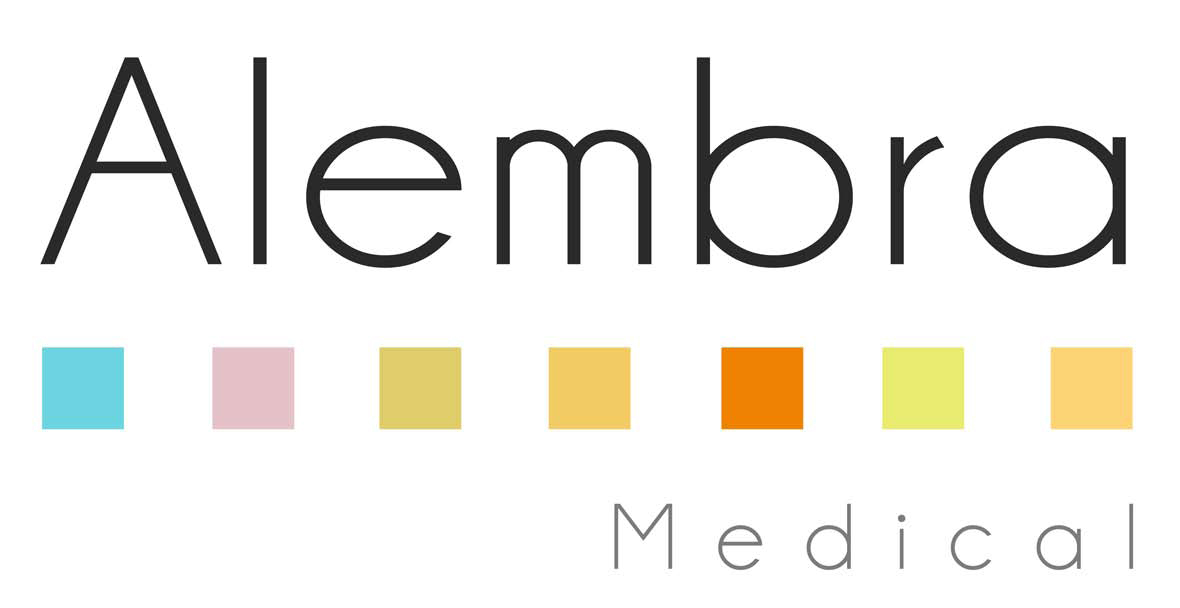
Alembra Medical
Location: 16405 Bronco Lane
Poway , CA 92064
US
Founded: 2013
Website: http://www.alembramedical.com
Twitter: @spesselnurse
Facebook: https://www.facebook.com/alembramedical/
Product Stage: Prototype/MVP
YTD Sales: Working on it
Employees: 1-2
How We Help Patients
Spessel is a completely new approach to urine collection that is comfortable, easy to use and non-invasive. With this innovative device, frail female patients with physical and/or cognitive impairments will be able to provide a diagnostic urine sample while resting comfortably in bed – no more bedpans, no more invasive, degrading catheterizations. With a reliable collection method, patients can be assured of decisive, timely diagnosis of a urinary tract infection (UTI), or lack thereof. The benefit of accurate detection is that patients are put on appropriate antibiotic therapy only when needed, not “just in case.” And early diagnosis reduces the risk of dangerous, even life-threatening complications of untreated UTI, such as sepsis or kidney damage, not to mention the trauma of hospitalization and illness.
The benefits are not just for patients, but for their family members as well; caring for an aged parent can be emotionally and physically trying. No one wants to see a loved one subjected to an invasive, traumatic procedure such as catheterization when urinary tract infection is suspected. A kindler, gentler and reliable option is possible and should be the new gold standard for empathetic care.
How We Help Physicians
Whether you are the nurse or carer trying to collect a midstream urine sample from an impaired patient, or the clinician diagnosing a UTI, Spessel has the potential to make your job easier and more satisfying. For nursing staff and caregivers, the easy to place, disposable device collects a midstream urine sample easily and efficiently. The patient doesn't need to follow any instruction or participate in any way and she can remain in bed if needed. Since the device sits outside the urethra, placement is not a sterile procedure. This means it can be used by non-licensed carers in any number of outpatient setting, such as skilled nursing facilities and the patient’s own home.
Compared to bedpans and catheters, Spessel is more ergonomically useful and can enhance the highly task-driven workflow of busy nurses. Care giving of the aged care population is challenging enough; informal as well as licensed caregivers deserve the right tool for the job; Given the current urine collection options, it is not surprising that 21% of urine samples from women are contaminated compared to 9% in men.(1)
For providers, Spessel delivers the diagnostic precision that is fundamental to giving good care. Results from an uncontaminated sample allows for decisive, timely treatment instead of repeat tests, delayed treatment and gambling with antibiotic therapy. We all want to give the best care, not have to choose between the lesser of two evils. I know this from my personal experience and the frustration from feeling like I am giving suboptimal care is what has motivated me to take the entrepreneurial journey.In the words of one respondent to a survey conducted by Alembra:“If there were such a device to obtain a clean specimen, it would take the ‘guess work’ out of prescribing suitable antibiotics,” - Director of Nursing, residential care home.
(1) Shamsundar, BV, Urine culture contamination: A one year retrospective study at the tertiary care hospital, Journal of Evolution of Medical and Dental Sciences, December, 2014, 3(74), p. 15552-15557.
How We Help Hospitals
“Beware of little expenses. A small leak will sink a great ship” – Benjamin Franklin.
Contaminated urine samples are the small leak that no health care institution can afford. Consider this analysis: In 2014, Medicare alone spent $79 million to perform 7.4 urine bacterial colony counts at a cost of $11 each.(1) Given that UTIs predominate among females, it is a fair assumption that the majority of those tests were on female patients. There is scant research on the topic of contamination rates, but one recent study found that approximately 21% of samples were contaminated among women, versus 9% in men.(2) At that rate, Medicare alone wasted approximately $17 million in lab fees for inconclusive data.
More importantly, each contaminated sample represents a patient who either had to repeat the sample collection and delay treatment, or was put on potentially inappropriate antibiotic treatment. Repeat urine testing incurs approximately $900 for extended hospitalization (3), not to mention that each contaminated sample represents misdirected/wasted laboratory resources.
Nursing time and resources are too valuable to waste on inefficient workflow practices such as mobiliizing an impaired, sick patient to the toilet - which may take two people for an unsteady patient - and waiting for the unpredictable act of urination in an incontinent patient who may not be able to detect or articulate their need to void.
There do not appear to be any studies or data on the costs and health care repercussions of delayed diagnosis directly tied to poor collection practice in our target population; If a patient is in the home or skilled nursing home setting, in theory the infection should be able to be diagnosed and treated in that setting, and yet Medicare data shows that the incidence of costly emergency visits and inpatient stays for UTIs consistently increases with age. Women aged 65 and over account for almost nine times the number of inpatient admissions for UTI compared to all women aged 18-64. (4)
Early detection of UTI in patients is by far a more cost-effective proposition than hospitalization for complications and advanced infection. A visit to the emergency room alone can incur thousands of dollars and sepsis - the worse-case scenario of advanced or under-treated UTI - is one the most expensive hospital diagnoses at approximately $18,000 per hospitalization.(5)
As a nurse-led startup, we hope affiliation with Alembra Medical's mission would be an especially attactive opportunity for Magnet institutions to demonstrate their commitment to nursing innovation and enhanced practice environment; our goals are perfectly aligned, as they are with insitutions with Nurses Improving Care For Healthsystem Elders (NICHE) protocols.
(1) HHs OIG Data Brief, September 2015, OEI-09-15-00210 Medicare Payments for Clinical Laboratory Tests in 2014: Baseline Data, Department of Health and Human Services, Office of Inspector General).
(2) Shamsundar, BV, Urine culture contamination: A one year retrospective study at the tertiary care hospital, Journal of Evolution of Medical and Dental Sciences, December, 2014, 3(74), p. 15552-15557.
(3) Data on file.Becton,Dickinson and Company: Franklin Lakes,NJ; 2010)
(4) Litwin MS, Saigal CS, editors. Urologic Diseases in America. US Department of Health and Human Services, Public Health Service, National Institutes of Health, National Institute of Diabetes and Digestive and Kidney Diseases. Washington, DC: US Government Printing Office, 2012; NIH Publication No. 12-7865, p. 368.
(5) Torio, C. and Moore, B., National inpatient hospital costs: the most expensive conditions my payer, 2013, Statistical Brief #204, May 2016, Healthcare Cost and Utilization Project, Agency for Healthcare Research and Quality.
How We Help Partners
Stakeholders in Spessel's success include home health agencies, skilled nursing facilities, hospitals, laboratories and insurers - virtually any organization dedicated to providing care to female geriatric patients. Partners will have the benefit of providing input in the early development stages and thus ensuring the final product incorporates desired elements.
We hope that the process of evaluating Spessel will bring attention to an issue that institutions may not even know they have. Consider the case study of Baylor Health Care System, which undertook a comprehensive analysis of urine culture contamination rates in 2012 after being alerted to a high incidence by an affiliate laboratory. Most of the system's 31 affiliated hospitals were not even monitoring contamination rates until a laboratory idenitified the probem, the study noted.(1)
In addition to financial support, partner organizations can provide crucial insights into their own experiences with the lifecycle of UTI management in our target population - How does staff obtain a sample? What challenges do they face? How much time does it take and what are the associated costs? What percentage of samples are contaminated what are the repercussions for patients and the institution? (wasted laboratory resources, repeat tests, delayed treatment, hospitalization...) In our own surveys, with few exceptions, respondents validated our hypothesis that the process is time-consuming, difficult and inefficient but we are eager to have access to more data and assistance with a formal analysis.
Partnering with Alembra provides an opportunity for institutions to demonstrate their commitment to geriatric-focused care. Literature is prolific on the need for geri-centric health care delivery. For example, four prominent agencies collaborated on publication of the Geriatric Emergency Department Guidelines to address a "burgeoning geriatric population" that poses "an unprecedented and overwhelming challenge to the American health care system as a whole and to emergency department (EDs) specifically." Among many recommendations, the document noted that "geriatric patient care requires equipment designed for a patient population with specific needs. Challenges involving mobility, incontinence, behavioral needs, etc. are best met with equipment designed for the effective and comfortable evaluation and treatment of geriatric patients." (2)
Sounds exactly like Spessel....
Lastly, partnership with Alembra Medical - a nurse-led start-up - is a unique opportunity to support innovation in bedside nursing, a sector that is severely underrepresented. The current innovation landscape favors digital technology, surgical interventions, robotics and a seemingly endless slew of apps that have no clinical validation. Meanwhile, one of the most common procedures in a large and growing subset of the patient population has been stagnantly inefficient for decades. By joining in our mission, partners can improve nursing practice in a fundamental and lasting way and demonstrate to the hardworking caregivers in the highly challenging aged care sector that their needs are being addressed.
(1) http://www.labqualityconfab.com/wp-content/uploads/BAker.Urine-Contamination-BHCS.pdf
(2) Geriatrac Emergency Department Guidelines, American College of Emergency Physicians, American Geriatrics Society, Emergency Nurses Association and Society for Academic Emergency Medicine, 2013, p. 13
Challenge Mission
Market Size
The market for Spessel is huge and growing. Our target market are physically and cognitively impaired female patients, but the product can also provide a valuable collection tool for able-bodied women as well. Its utility is ubiquitous to multiple health care venues both in the United States and abroad, including home health care, skilled nursing homes and hospitals. There are statistics from multiple agencies documenting the rise in aging populations:
In 2012 there were almost 17 million women 70 and over in US alone and that number is projected to be almost 30 million in 2030. (An Aging Nation: The Older population in the United States, May 2014, US Census Bureau). Worldwide there were approximately 71 million women aged 80+ in 2012 and that number will increase to approximately 250 million by 2050 (“Ageing in the Twenty-First Century: A Celebration and a Challenge” United Nations Population Fund, 2012).
Although there are no sta
Projected 3 Year Growth
Once the product is validated clinically, our goal is to find an established consumable device manufacturer who will license rights and commercialize the product via existing distribution and sales channels.
How We Will Make Money
Revenue will be from sales via a distributor(s) to be determined, which service the same facilities that Spessel targets, both in the US and abroad. Pricing will be determined by final design specifications, manufacturing costs and a more in-depth cost analysis; Feedback to date suggests a target price of $10 per unit will make the venture profitable but also be cost-effective compared to the current standard of care, taking into account staff time, cost of contamination and treatment for complications due to delayed diagnosis.
About our Competition
Our competitive advantage is clear – compared to bedpans and catheters, our product is patient-focused and reliable. At a target price of $10 per unit, Spessel is more cost effective than the current standard of care when taking into account the supplies and staff time. Catheterization is an invasive procedure that requires licensed nursing staff; In contrast, Spessel can be used by unlicensed staff that comprise the majority of the workforce in skilled nursing/assisted living facilities, and the informal caregivers who look after aged women in their homes.
Spessel is a novel innovation in a sector that has remained unchanged for decades. Catheter manufacturers would be indirect competitors, but Alembra is creating ownership of an entirely new segment in the urine collection market with our novel product and pending patent. There are a few products produced out of the UK ( Peezy) and one in Australia (Mittstrom) which are designed to be
Innovation Details
Intellectual Property Summary
A provisional utility patent has been filed by an expert Unites States law firm; a PCT has been filed. A trademark on Spessel is pending.
Clinical Information
The sole purpose of our crowd funding effort is to manufacture Spessel for use in pilot studies and ultimately a clinical trial. The prototype functioned as designed in a bench test using dyed water; Spessel adequately produced a highly dilute sample of liquid which would correlate to the goal of separating a non-contaminated sample into the collection chamber.
We are ready to take the next steps: transparent, rigorous clinical validity will be the cornerstone of Spessel's success and potential to radically improve nursing practice and patient care. Alembra is working hard to create a fantastic product to put it in the hands of nurses and caregivers in any number of relevant partner venues: nursing homes, home health agencies, rehabilitation facilities, hospital wards and emergency rooms, among others.
We have partnered with a highly qualified industrial design company with a proven track record of designing commercially successful medical devices.
With input from pilot studies on human subjects, our goal will be to finalize the device shape and materials, manufacture the product and then subject Spessel to a formal clinical study to validate it's efficacy as a reliable midstream sample collection tool. Our 510(k) exempt status should facilitate IRB approval in partner facilities.
In addition to funds, we are interested in identifying institutions with the staff, access to patients and expertise with clinical trials who would be willing to work with us on designing and implementing an appropriate study.
.
Regulatory Status
A pre-submission review by the FDA has concluded that Spessel is 510(k) exempt based on comparison to an established predicate.
How we will use the funds raised
Our next goal is to design and manufacture a second iteration prototype for use in pilot studies on human subjects. This 12-18 month process will be undertaken by a highly competent, experienced product development company in Australia, ide Group, (http://www.idegroup.com.au/) which has nurtured our project from its infancy. Activities will include, among others:
- consultations with experts in gynecology/urology, infectious disease and aged health;
- research of mechanical principles and material analysis;
- engineering of design concepts;
- prototype tooling and manufacture;
- data collection and recording; sterilization protocols;
- recruitment of pilot subjects and oversight of study design/execution.
Effectiveness: Success will be determined by production of a functional device that meets the design objections:
- easy to place according to user feedback
- comfortably rests against female perineum
- stays securely in place
- collects urine sample without leakage
- consistently provides sample that are free of microscopic contaminants per laboratory threshold criteria
Thank You
The United States and countries around the world are facing unprecedented health care demands stemming from the accelerated growth of aged populations.Clinicians, academics, thought leaders and government think tanks have all publicized the need to look beyond the status quo and promote creative approaches to the special needs of the senior population. Alembra Medical is answering the call - We agree that providing quality care to this growing group of patients, health care delivery needs to be cost-effective and efficient. And that means that giving hardworking health care workers the right tools for the job. They deserve it and patients deserve it.
So far, Spessel has been a one-nurse mission. Only with outside support can Alembra improve patient care where it matters most - the bedside - and ensure that the women we love receive effective, empathetic care, not just the lesser of two evils.
Of course we welcome larger donations, but surely there are 2,000 people who have been touched by a nurse or caregiver and want to show their appreciation by donating $100 to get us to our goal; there must be 4,000 who love a nurse or care about aged health enough to donate $50 and get us to our goal. If we got $25 from everyone who knows how hard it is to care for an aging loved one, or respects the work that nursing staff provide day in and day out, we would not only easily reach our goal, PayPay would implode. That would be a great thing - please give PayPal something exciting to talk about.
If donation is not possible, our call to action for clinicians of all stratifications is to take literally one minute to fill out a survey and share your experience with the urine collection process in geriatric females. Visit our website at www.alembramedical.com and click on the survey link.
Updates
No updates found .
Supporters
-
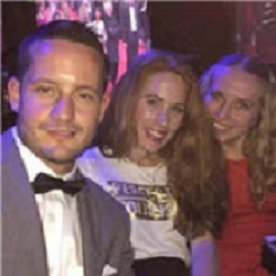
10/13/2017 - Followed the project., Master’s Degree in Business Administration from Seton Hall University
10/06/2017 - Followed the project., Master’s Degree in Business Administration from Seton Hall University
10/06/2017 - Liked the project.
11/29/2016 - Liked the project. Instant Feedback
Instant Feedback
Help us find best new ideas to fund by telling us what you think. Your feedback goes straight to the team behind this project in private, so tell them what you really think.
15Medstartr
Index Score15
Interest
Score0
Adoption
Score3
Likes0
Partners0
Pilots2
Follows-
This campaign has ended but you can still get involved.See options below.
$26 pledged of $200,000 goal
Instant Feedback
Help us find best new ideas to fund by telling us what you think. Your feedback goes straight to the team behind this project in private, so tell them what you really think.

